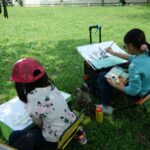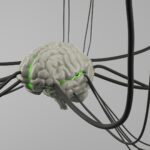Photo by Sumeet B on Unsplash. Many college students are given the advice of “a good night’s sleep” when aiming for a good grade on a test. But researchers at MIT have found that the consistency of quality sleep matters... View Article
Latest Posts
In the digital age, it takes a special strength to resist distractions and stay focused and productive. This is a valuable skill for anyone to have, and many parents are aware of the dangers of too much screen time. But... View Article
Technology continues to set the pace of change in business at a lightning-fast speed. When new technology and new ideas are introduced constantly, business owners need to provide their workers with the skills to adapt. This means that workers are... View Article
Outdoor education is a term used to describe a broad range of activities that may encompass concepts and ideas learned in the classroom. Due to severe budget constraints, major cutbacks have been made to Ontario’s educational sector, noticeably to outdoor... View Article
Recent findings published by researchers from the University of Pittsburgh and Carnegie-Mellon University have shown that new brain activity patterns are formed when long-term learning takes place. The results of this research are significant, as they may help unravel solutions... View Article
There are many important side effects that come with using cannabis products, as Michael J. Brues reports in his article. Photo by CRYSTALWEED cannabis on Unsplash. While cannabis is commonly used for recreational purposes, many also use it to address... View Article
Recent research conducted by cognitive neuroscientist Zhenhan Qi and her colleagues at the University of Delaware provides new insights into how the brain functions when learning a new language. Findings suggest that the right hemisphere of the brain also plays... View Article
Photo by Casey Horner on Unsplash. Researchers from the University of Michigan have determined just how much of a nature dose you need in order to reduce stress. It is well known that taking time to be in nature leads... View Article
There is a popular belief that the left brain is the logical, rational and analytical side of the brain, while the right hemisphere is associated with emotion and creativity. Perhaps building on this idea of lateralization, some also hold that... View Article
Music can help boost mood, creativity, and productivity. At least, this is what many believe as they listen to music while working. However, psychologists from the University of Central Lancashire, University of Gävle in Sweden and Lancaster University discovered that... View Article
The United Nations (UN) chooses a topic of global importance every year for which to raise awareness. This year, for 2019, they have chosen indigenous languages, as Sarah Rogers reports in her article. The UN aims to shine a light... View Article
On New Years Eve, 1983, Isaac Asimov wrote about his prediction of the state of the world and technology in the year 2019. Now that we have reached 2019, it is worth reflecting on his predictions. Some of Asimov’s most... View Article
In a document released by the Communist Party of China Central Committee and the State Council, the Chinese government outlines their goals for preschool education over the next few years. Li Xia reports on this matter in her article for... View Article
Through research and experimentation, scientists discovered that that children’s natural learning process does not align with how school teach reading. The dangerous effects of an improper education system The damage resulting from a misalignment between what children need and what... View Article
A new neurological study shows that just 10 minutes of mild exercise can improve memory function. Gretchen Reynolds explores this concept in her article. Photo by João Roger Goes Pereira on Unsplash. The benefits of exercise on health In the... View Article
Two decades ago, British linguist Richard Hudson defined hyperpolyglots as people who are fluent in at least 11 languages. Hyperpolyglots are rare but have existed for centuries, and neuroscientists are trying to understand the nuances that set them apart from... View Article
Technology has made a large impact on many aspects of our lives, especially on the younger generation. Due to the vibrant colours and interactive components of digital devices, it is not surprising that children today find joy in activities including... View Article
Researchers debate about how working memory works in dueling papers in the August 8 edition of the Journal of Neuroscience, as David Orenstein from MIT News explores this in this article. Working memory refers to the part of short-term memory... View Article
89% of girls around the world complete primary education. However, only 77% complete lower secondary education (grades 5-8). In low income counties, the portion of girls who complete primary education can be as low as ⅔, and ⅓ for lower... View Article
Parents across Ontario strive to put their children into a French immersion program. But while they may do so with the hopes of putting them on the path to bilingualism, the program actually facilitates an elitist education system and separates... View Article



















